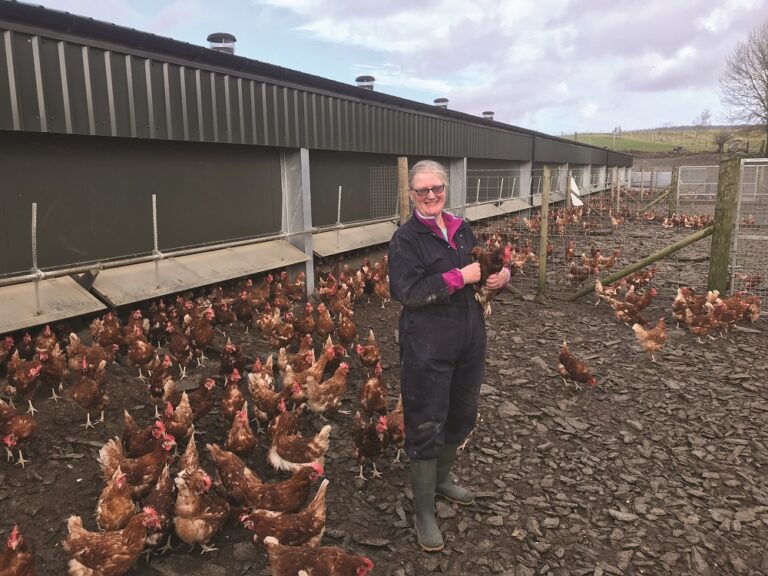Winning the Stockman of the Year award, in the 2018 National Egg & Poultry Awards, was a total shock for Denbighshire-based newcomer to poultry, Lyn Williams
By Rachael Porter
“I was surprised when my employer approached me and said that he and ForFarmers’ Jim Gould wanted to nominate me for the category. And I was even more surprised when they told me, a few weeks later, that I’d been selected as a finalist,” she says. “So, scooping the title really was a shock – albeit a pleasant one.”
Lyn found out that she’d won during the glittering award ceremony, held in London in June 2018. “A trip to London was a treat in itself – that’s not somewhere I go very often,” says the 60-year-old who, by her own admission, is a relative newcomer to the poultry industry. “So, winning made it even more special.”
Lyn had worked in the hotel and hospitality industry for most of her working life and past jobs had always had to fit around raising a family. “I eventually worked my way up into an administration role, after taking a course in my 50s and was working as a hotel receptionist. But I found that quite stressful – people can be very demanding.”
So, when her neighbour and egg producer approached her in 2015 about taking a stockperson role on the 16,000-bird free-range egg laying unit that he was planning to build, she thought ‘why not?’ “I fancied a change and the job sounded varied, interested, rewarding and relatively low stress,” she says.
Lyn is from a farming background – her father was a dairy producer and she worked on the farm when she was in her teens and 20s, after leaving school. “But it had been a while since I worked with livestock. But my administration skills have come in handy – there’s a lot of careful record keeping and paperwork that’s required.”
Her typical day begins at 6.30am and she finished at 11.00am. “It’s a walk of literally a few hundred metres to get to work, the working day is short and I get a day off every week. I really enjoy my job and I think that’s probably key to doing it well. The time flies by when I’m at the unit – we’re busy and the work is interesting and varied.”
Her employer, Llyr Jones, who owns and manages Derwydd Cyf, the free-range egg unit based near Corwen, told the competition judges that he was impressed at how quickly and well Lyn adapted to her new role of running the laying unit on a daily basis.
“She takes full responsibility for the unit and her attention to detail is exemplarily. She has undergone a very steep learning curve but has handled it extremely well, and this has allowed me to concentrate on other aspects of my farming business in the knowledge that the welfare and production of the unit is in her capable hands of Lyn,” he says.
Jones adds that he actually approached Lyn to run his laying unit before he approached the bank for investment. “It was vital to have the best staff possible because this was a high investment project for me and it needed to give the required financial return to succeed.
Producing eggs for Tesco through Anglia Free Range Egg Packer, the unit was established in January 2017 on a green-field site on an upland beef and sheep farm that had no experience of poultry farming before. The building is a multi-tier aviary system, which also has solar and ground source electricity, as well as heat energy systems.
“Lyn has played a key role is this success and has delivered even more than I expected of her,” adds Jones. “She returns, voluntarily, to the unit every evening to check on the hens, such is her dedication and passion for caring for the hens. And this is helps to ensure that any problems are detected early so that they can be corrected quickly.”
“I do go back every evening,” says Lyn, “just to check the girls have settled for the evening and are safely roosting for the night. It is surprising how often you will come across hens that may have become trapped or ‘compromised’ in different parts of the system, such as the nest boxes. You can then deal with this before any long-term problem occurs for the hen.
“I can also easily spot any unwell hens at this quiet time of the day. And these birds can then be given the special care and attention that they need to get them well again. I have found that this evening visit is a vital part of keeping hem mortality to a low level of 3.7% for the flock cycle and preventing any unnecessary suffering to the hens.”
Lyn is, quite rightly, proud of the high flock productivity – 325 eggs per bird – for the unit’s first flock. “I am also pleased with the flock’s low mortality rate. Both KPIs indicate that we did a good job at maintaining bird health and welfare and I know this is good for the business, as well as the wider public perception of livestock farming.”


